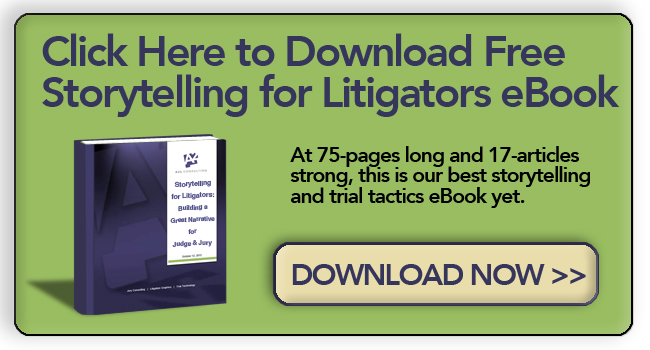by Ryan H. Flax, Esq.
(Former) Managing Director, Litigation Consulting
A2L Consulting
In my last post, I discussed the importance of every trial lawyer of developing a two-track procedure in every trial – one track that focuses on developing a convincing story that jurors can instinctively relate to, and one track that focuses on building a record of law and facts for a possible appeal.
The first thing that every trial lawyer must do is recognize this two-track necessity and begin to immediately develop case themes around key facts. It’s essential to work as a team to identify your story and what facts fit into it. Remember, stories are supposed to be interesting and entertaining. They have a beginning, a climax, and an ending. They have a theme, a setting, and fully developed characters. Help your case by making it understandable to the jurors and by keeping them from being bored.
Why a Good Story Matters
Litigation is not easy for anyone involved. It’s usually something of a complicated mess for us as attorneys. For jurors it’s likely the most complex, complicated, and confusing thing they’ll ever be asked to participate in. After all, think of what is being demanded of them. You’re asking them to understand an area of law that probably took you an entire law school semester to understand and to apply that law to some new and unusual facts, then to hand one side a lot of money or send someone home empty-handed. As a litigator, you have the job of making it easier for them to find things your way.
A key component of making it easier for jurors and making them feel like they understand you and your case is storytelling. Storytelling is both an art and science, and using storytelling techniques will make you a more persuasive litigator.
A story will emerge during a trial, and it may as well be yours. Mock trials and focus groups show us that when there are camps within a jury representing the two sides of the case, each camp will have a fairly consistent story. Consistently, those stories: (a) are short; (b) fit with “common sense”; (c) borrow some of the salient facts from the trial; (d) are complete – with a start, middle and ending, including what happened and what should happen; (e) take only a few moments to tell and use plain language; and (f) once embedded, are difficult – if not impossible – to change in jurors’ minds.
The question is, where do these stories jurors use come from?
Humans automatically make stories out of virtually all life events to gain a sense of control, even if it’s a false sense. It’s the difference between collecting bare facts and interpreting them in a coherent manner. Most people can’t resist making assumptions, drawing inferences, and imposing upon the facts what they “mean” rather than merely accepting information as is. Most of what people discuss in their social lives are stories and gossip – not random facts.
So, again, because we know that your jury will be using a story to sort out your litigation facts and determine its results, whose story do you want the jurors using -- one they’ve made up, one provided by opposing counsel, or yours?
As I just said, litigation is probably the most complicated thing your jurors will ever have to be involved with in their lives, but, even setting aside the subject matter and law of the case, let’s take a look at what each juror has to do just for the jury to reach a verdict:
- show up,
- stay awake,
- be motivated enough to pay attention,
- be mentally and physically able to pay attention,
- know what is important to attend to,
- understand what they are seeing and hearing,
- be motivated and able to remember,
- recall the information after some period of time,
- be able to repeat the information in their own words, and
- be willing and able to convince fellow jurors who disagree with them.
That’s just one juror’s task. Moreover, the other jurors must also be awake, pay attention, and understand, etc., so that they can operate as a unit. That’s a lot required of those doing their civic duty, so the easier you can make it for them to do the tasks you can influence, the better.
Other A2L Consulting resources related to storytelling in litigation:
- WATCH: Storytelling for Litigators Webinar
- DOWNLOAD: Storytelling for Litigators E-Book
- Top 14 TED Talks for Lawyers (focus on storytelling)
- How To Emotionally Move Your Audience
- Are You Smarter Than a Soap Opera Writer?
- Don't Be Just Another Timeline Trial Lawyer
- Litigators Can Learn a Lot About Trial Presentation from Nancy Duarte
- Portray Your Client As a Hero in 17 Easy Storytelling Steps
- No Story, No Glory: Closing Arguments that Don't Close Loops
- 5 Keys to Telling a Compelling Story in the Courtroom







Leave a Comment